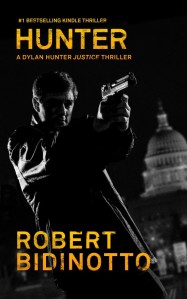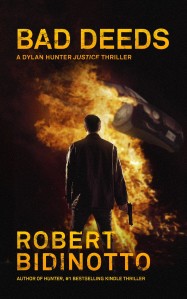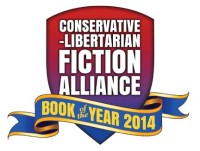Whenever I hear someone denigrating the self-publishing option, I think of the many tales of woe that I read and heard over the years from traditionally published authors — stories that discouraged me, for a long time, from writing fiction. Pursuing the tortuous path of finding an agent, then waiting for him or her to find a publisher, then to surrender many of one’s valuable rights in exchange for a paltry advance and pathetic royalties — that seemed to be a futile exercise in masochism. Why bother throwing myself into that meatgrinder?
So for a long time, I tried to forget my dream of writing novels. Only after I learned, around 2010, of the exciting option of self-publishing ebooks, did I dare to dust off old notes and story outlines about a unique vigilante character with a mysterious past and an ambiguous identity…
The state of traditional publishing has only been getting worse with each passing year. Just this week I’ve run across a number of fresh horror stories by authors who are sharing their shocking experiences in the publishing industry.
With eight highly praised thrillers that have flirted with the bestseller lists, British author Matt Hilton is the kind of model author most writers aspire to be — the kind we think is living the good life, with his publisher and bookstores eagerly partnering with him to soar to new heights of success. That’s why you will probably be shocked by this long blog that he’s just posted about his nightmarish experiences with publishers and booksellers.
Nor is Hilton alone. The next day, another prolific author, Stephen A. Hunt, blogged about similar experiences of authors that most outsiders would think are rolling in riches — but who are throwing in the towel and abandoning writing.
No, it’s not just publishers and bookstores across The Pond mistreating authors. It’s happening everywhere, certainly in the States. Famous mystery and suspense author Lawrence Block has been plying the trade for half a century. This month, he weighed in with another story of shocking publisher stupidity, which he ended on this sarcastic note:
“Just a sweet little story on a charming aspect of contemporary publishing. Hard to imagine that some writers actually toy with the notion of doing it all themselves. How can they possibly make a go of it without the benefit of top professionals in their corner?”
But surely those authors hitting the bestseller lists, like the New York Times, have hit the big time — right? Guess again. “Bestselling” author Soren Kaplan has just posted a remarkably candid blog titled “Debunking the Bestseller,” revealing how he and many other savvy authors are hiring professional p.r. consultants to help them “game” the bestseller lists, largely through phony, well-timed bulk purchases of their own books. Yes, many of the “bestsellers” you see are fakes, pushed there through the artifices and manipulations (“bestseller campaigns”) of companies such as ResultSource. Says Kaplan:
There’s good reason why most industry insiders would prefer that the wider book-buying public didn’t learn about these campaigns. Put bluntly, they allow people with enough money, contacts, and know-how to buy their way onto bestseller lists. And they benefit all the key players of the book world. Publishers profit on them. Authors gain credibility from bestseller status, which can launch consulting or speaking careers and give a big boost to keynote presentation fees. And the marketing firms that run the campaigns don’t do so bad either.
Kaplan explains how it worked in his case to manufacture his “Wall Street Journal bestseller”:
I too contracted with ResultSource. The strategy the firm laid out for me was relatively straightforward. I would contact my Fortune 500 clients and others and ask them to preorder copies of my book. If I could obtain bulk orders before Leapfrogging [his book] was released, ResultSource would purchase the books on my behalf using their tried-and-true formula. Three thousand books sold would get me on The Wall Street Journal bestseller list. Eleven thousand would secure a spot on the biggest prize of them all, The New York Times list.
Why would Kaplan do this? This is where it gets interesting, because he argues that, these days, such methods have become about the only way for an author to succeed through traditional publishing:
When I first approached my publisher, Berrett-Koehler, they insisted I read an article they give to every prospective author called The 10 Awful Truths about Book Publishing. The number of books being published has exploded to 3 million titles a year, including self-published works. Despite this tsunami of growth, industry sales have been declining every year since 2007. To make matters worse, the average book has less than a 1% chance of being stocked in a bookstore. These are painful realities for the aspiring author who wants to get his or her message out to a mass audience with the intent of changing the world.
Despite these frightening facts and figures, I was thrilled when I received Berrett-Koehler’s book contract. They receive over 1500 book proposals a year and only accept and about 30-40. If I could beat these odds, I told myself, surely I could parlay my good luck into getting my book stocked on at least one bookseller’s shelf.
What I hadn’t fully internalized was that I would be almost entirely responsible for the marketing and promotion of my book. Publisher’s [sic] produce and distribute books, but that’s about all they do these days. It was my job to create the real market demand. [emphasis added]
Kaplan reports that before he launched his book, he had been “introduced to someone who had just left her role as an executive at Harvard Business School Publishing. She was the first to mention ‘bestseller campaigns’ to me. According to her, ‘everyone’ was doing it, especially for non-fiction business books like mine.” His excitement over having found the keys to the publishing kingdom “was tempered with the recognition that the trust I had placed in the very lists endorsed by reputable publications like The Wall Street Journal, The New York Times, Publisher’s Weekly, and others, might not represent the institution I had assumed it was.”
He sums it all up with this: “It’s no wonder few people in the industry want to talk about bestseller campaigns. Bestseller lists are revered, longstanding, and – of course – incredibly influential. The fact that it has become standard practice to work the system that determines which titles wind up on these lists is not exactly good PR for an industry that’s already in turmoil.”
For sure.
Kaplan has given me a new reason to appreciate my decision to self-publish: I can look into the mirror and know that whatever sales and recognition I realize, I achieve through my own honest efforts. Like Kaplan’s book, HUNTER also hit the “Top 10” of the Wall Street Journal bestseller list, and it also soared to near the very pinnacle of the Kindle bestseller list. But unlike his purchasers, HUNTER’s tens of thousands of buyers were retail customers — not bulk purchasers coordinated by some hired consulting firm.
That such devious practices have become S.O.P. in publishing circles is only one more measure of its pervasive sickness. But the true measure of that sickness lies in endless stories of stupidity, manipulation, and betrayal, by a once proud and noble industry, and related by its many victims: the struggling authors who sustain it.
 A real-life Dylan Hunter — who happens to be a fan of my debut novel, living in Denver — took this photo, showing off his personally inscribed copy of HUNTER.
A real-life Dylan Hunter — who happens to be a fan of my debut novel, living in Denver — took this photo, showing off his personally inscribed copy of HUNTER.





 Photo (c) by Debbie Scott
Photo (c) by Debbie Scott




